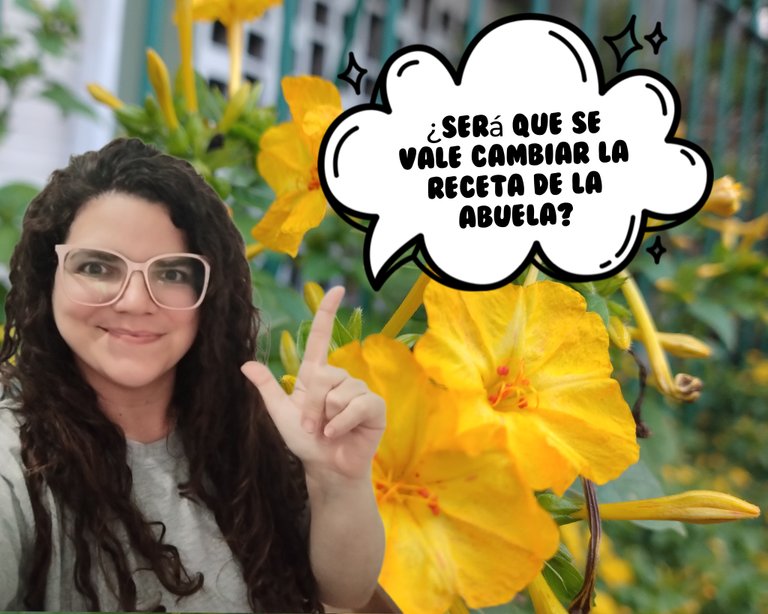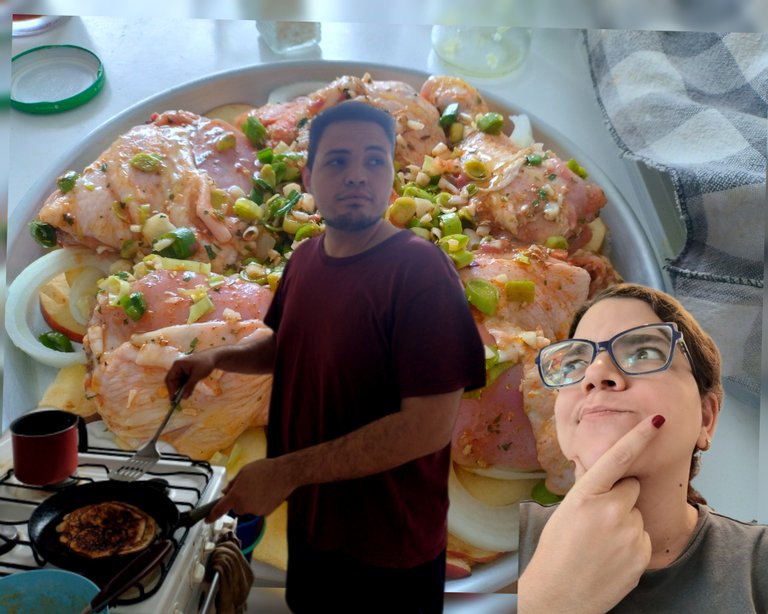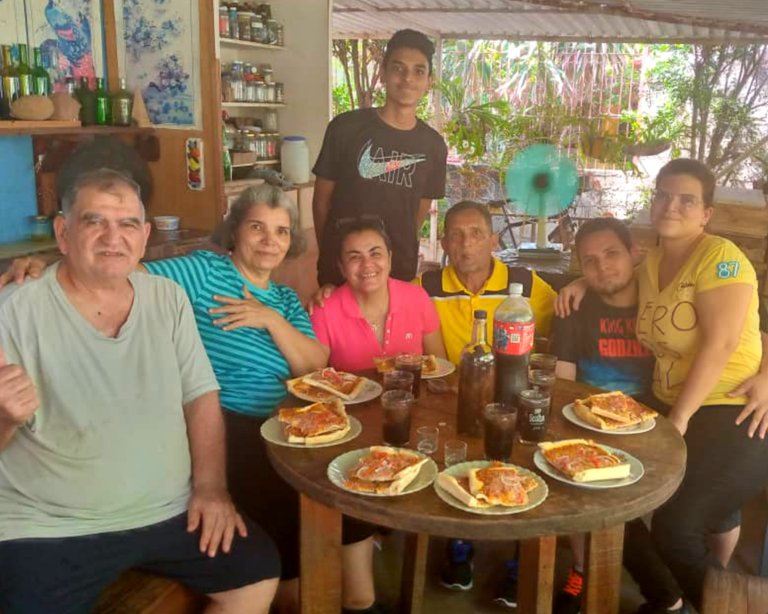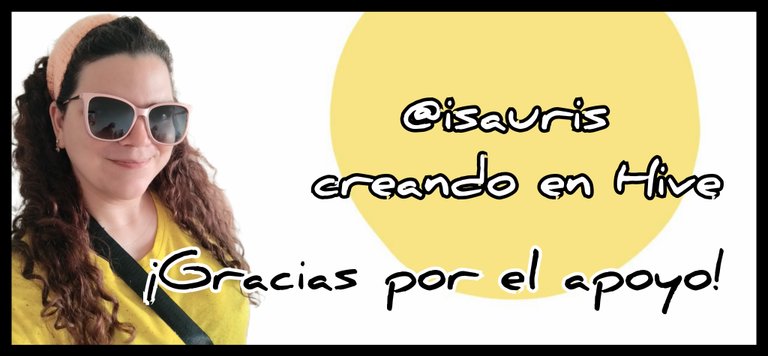
Creo que todas las familias tienen una receta que ha pasado de generación en generación, esa que la abuela preparaba para consentir a la familia y que tu mamá (o papá) aprendió y exhibe con orgullo; esa joya de la corona de la herencia familiar. Y es que las tradiciones son la única herencia segura, pues no todas las familias tienen bienes para legar, pero si costumbres (buenas y malas).
Mientras mi esposo y yo cocinabamos un arroz con leche, cuya receta se quedó a medio camino entre la de mi mamá y la de su papá, nos pusimos a debatir sobre las recetas familiares y sobre como, inevitablemente, tienden a cambiar, porque las circunstancias siempre cambian.
Para empezar, este arroz con leche es diferente desde el principio, pues la "leche" que nos podiamos permitir en Venezuela, era una bebida lactea o compuesto lacteo; una bebida en polvo parecida a la leche, de bajo costo y dudosa calidad. Recuerdo una vez, que al preparar una de esas "leches", noté que se le separaba un sedimento imposible de disolver y que no pude averiguar de que se trataba; habia otras marcas, que algunas veces, tenian un sabor salado o un color amarillento. Aunque el punto de la conversación no va por ahí, no hicimos incapie en la calidad de los ingredientes sino en cómo, cada quién, hace lo mejor que puede, con lo que tiene, y esa forma de ver la vida es también una valiosa herencia.

Pero, teniendo en cuenta la calidad de los ingredientes, ya por ahí el resultado final tiene por fuerza que cambiar, aunque la receta permanezca inalterable y siga siendo básicamente: arroz, leche, azúcar y canela. Por un lado mi suegro solo le pone canela en rama (hasta donde mi esposo recuerda), mientras que mi mamá usa canela en rama, pero también cáscara de naranja. Finalmente le hemos colocado cáscara de limón (amarillo), canela en polvo y tres clavos de especie.
La conversación siempre gira sobre lo distinto que saben algunos platillos, y ya la hemos tenido varias veces (cada vez que cocinamos juntos); pues algunas cosas saben mejor y a otras les "falta algo", un algo difícil de definir. Y es que cada platillo que preparabamos en Venezuela tiene un sabor distinto ahora que lo preparamos en Argentina y seguro que, aquellos que hemos heredado por parte de mi familia paterna sabían diferentes cuando mi abuela los preparaba en España. ¿Quién no ha sustituido un ingrediente por otro para completar una receta? ¿Quién no quiere dejar su marca personal en el recetario familiar? ¿Pero está bien visto cambiar la receta familiar?

Mantener recetas y tradiciones familiares nos hace sentir más cerca de nuestros ancestros, nos recuerda de donde venimos y nos da identidad como familia; pero las familias crecen y se unen a otras, la identidad cambia y se transforma, y eso está bien. No está mal si hacemos la receta de mi mamá o la de mi suegro, no está mal si hacemos una nueva que lleve un poco de ambas o nada de las dos, lo que estaría mal es no dar espacio a las nuevas recetas o costumbres. Es hermoso pensar en el legado familiar como una extensa compilación en la que cada uno ha podido dejar su huella de amor, lo mejor de si mismo y no como una lista de reglas que nos encadenan.
Ahora cuéntame: ¿ En tu familia, se vale cambiar la receta de la abuela?
Imágenes de mi archivo, editadas en Snapseed y Foto Collage GridArt. Traducción al inglés por Google Traductor.

I believe every family has a recipe that has been passed down from generation to generation, the one grandmother prepared to pamper the family and that your mother (or father) learned and proudly displays; that crown jewel of the family heirloom. Traditions are the only sure inheritance, as not all families have possessions to pass on, but they do have customs (both good and bad).
While my husband and I cooked rice pudding, the recipe for which was halfway between my mother's and his father's, we began to discuss family recipes and how they inevitably tend to change, because circumstances are always changing.
To begin with, this rice pudding is different from the very beginning, as the "milk" we could afford in Venezuela was a dairy drink or dairy compound; a powdered drink similar to milk, inexpensive and of dubious quality. I remember once, when preparing one of those "milks," I noticed a sediment separating from it that was impossible to dissolve, and I couldn't figure out what it was. There were other brands, which sometimes had a salty taste or a yellowish color. Although that's not the point of the conversation, we didn't emphasize the quality of the ingredients but rather how everyone does the best they can with what they have, and that way of seeing life is also a valuable inheritance.

But, considering the quality of the ingredients, the final result is bound to change, even if the recipe remains unchanged and basically consists of: rice, milk, sugar, and cinnamon. On the one hand, my father-in-law only uses cinnamon sticks (as far as my husband can remember), while my mother uses cinnamon sticks, but also orange peel. Finally, we've added lemon peel, ground cinnamon, and three cloves.
The conversation always revolves around how different some dishes taste, and we've had it several times (every time we cook together); some things taste better, and others are "missing something," something that's hard to define. Every dish we made in Venezuela has a different flavor now that we make it in Argentina, and surely those we inherited from my paternal side of the family tasted different when my grandmother made them in Spain. Who hasn't substituted one ingredient for another to complete a recipe? Who doesn't want to leave their personal mark on the family recipe book? But is it okay to change the family recipe?

Maintaining family recipes and traditions makes us feel closer to our ancestors, reminds us of where we come from, and gives us an identity as a family. But families grow and join others, and our identity changes and transforms, and that's okay. It's okay to make my mother's recipe or my father-in-law's recipe. It's okay to make a new one that includes a bit of both or neither. What would be wrong is not making room for new recipes or customs. It's beautiful to think of the family legacy as an extensive compilation in which each person has been able to leave their mark of love, the best of themselves, and not as a list of rules that chain us down.
Now tell me: In your family, is it okay to change grandma's recipe?
Images from my archive, edited in Snapseed and Photo Collage GridArt. Translated into English by Google Translate.

Se vale. Cambia, lo seguro es el cambio, nada permanece inalterado.
Hasta la piedra se desgasta y desaparece.
Obviamente se vale el cambio, sea por los ingredientes, el tiempo de cocción o agregarle el toque personal. Lo importante es que prevalezca la tradición y los cuentos de las veces en las que la abuela lo hacía (sea bisa o tataratataratatara.. abuela)
Por supuesto que los cambios son bien recibidos. Cada uno le da su sazón a los platos y ahí radica la magia.
Genial amiga.
Saludos.
Congratulations @isauris! You have completed the following achievement on the Hive blockchain And have been rewarded with New badge(s)
Your next target is to reach 950 posts.
You can view your badges on your board and compare yourself to others in the Ranking
If you no longer want to receive notifications, reply to this comment with the word
STOPCheck out our last posts:
Fue muy entretenido leerte, seguir las tradiciones y modificarlas es parte de hacer las tradiciones propias!
Saludos